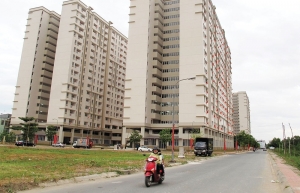More than rhetoric needed for dilemmas in social housing
The Ministry of Construction is reducing the number of social housing units from 1.4 million to over 1 million, even though the market currently has a limited supply. What is your perspective on the matter?
 |
| Troy Griffiths - Deputy managing director Savills Vietnam |
I believe it is tough to respond swiftly since there are so many variables to consider, such as who is qualified, how to deliver, and whether to resell. That’s very challenging. Unless it is resolved and a one-stop delivery shop is established, it will be difficult to increase those numbers rapidly.
In addition, private sector involvement has not been sufficiently lucrative. That is a crucial point. Concerning the private sector, worker and migrant housing near industrial parks is often discussed on social media. I do not believe that is social housing. I believe this is affordable housing that can be constructed profitably by private sector developers. They have just been generating money elsewhere and have not considered or visited this location.
Countries such as India, China, and everywhere else have worker housing, a highly robust and active private sector market. Thus, I do not believe that to be social housing.
How would you rate the social housing market by supply, demand, and cost now compared to a year ago?
While there has been a great deal of discussion, there has been very little action. We often work on feasibility studies for developers, and very little has been added. Several legal, bureaucratic, and administrative agencies are attempting to get this information out; therefore it is not really anyone’s issue or responsibility.
Part of the problem is that there is a great deal of difficulties with these types of laws all over the globe, which is a very timely topic given the significance of social housing. While there has been plenty of rhetoric and minor legislative adjustments, they have not been sufficient to attract private sector developers in the past.
Until around six months ago, private sector developers were the primary concern. Developers in the private sector made a lot more money in other sectors, and so social housing was not financially viable to them. Thus, this is part of the issue. The existing social housing formula makes it very difficult for the vast majority of developers to generate a profit.
Do you mean that the existing supply is insufficient to fulfill the achievement?
Definitely. But, I would argue that many of the estimates that are often used in the media and in policy, such as 800 million, or 1.4-1.6 million, are not accurate. All of them are not required to be delivered simultaneously, nor are they all required by government policy.
There are several social and cheap housing options. The private sector can provide affordable homes. When it comes to social housing, the government must collaborate with the private sector.
Why aren’t global investors enthusiastic about these projects?
What we see in many other growing nations, like India and China, is that the private sector can really take care of a significant portion of the inexpensive housing, such as worker housing near industrial parks and the like, and this is possible. I believe that is now occurring in Vietnam, and foreign money is now seeking these types of properties.
With social housing, however, there is a great deal of machinery that is challenging for international companies. There are no regulations regarding eligibility. If you are a foreign player, you need a lengthy pipeline of tens of thousands of social housing units. And to date, it has been in bits and pieces.
If this were to be expanded to include a more top-down strategy in which the government assumed certain guarantees and coordinated these initiatives into tens of thousands of social housing units, I am confident that international investors would be quite interested because then they can establish their size and economies of returns. But if it’s just fragments here and there, I believe it will be extremely difficult.
In addition, they have always had a very narrow margin, which has not been sufficient in the past. They may get these margins and larger returns through alternate investments. This is why it has not been very appealing. You may earn 9.5 per cent at any first-year bank. Now that is decreasing a little. You are only provided a 10 per cent buffer against creating social housing, despite the inherent dangers involved. Therefore, you can see that it is not very appealing.
How, given the present market environment, do you recommend adjusting supply and demand?
I believe government policy is headed in that direction. Recent policy statements have included a reassessment of the margin offered to developers in an effort to entice developers, as well as the guaranteeing of pipelines for specific companies.
This is an excellent endeavour, and the more policy improvements that occur, the better. Yet, I do not believe there will be a rapid resolution to this issue.
 | Social housing market glacier melting As a number of new laws and social housing loan packages are implemented towards the end of the second quarter, the real estate market in Vietnam is hoping for a rebound. |
What the stars mean:
★ Poor ★ ★ Promising ★★★ Good ★★★★ Very good ★★★★★ Exceptional
Related Contents
Latest News
More News
- Construction firms poised for growth on public investment and capital market support (February 11, 2026 | 11:38)
- Mitsubishi acquires Thuan An 1 residential development from PDR (February 09, 2026 | 08:00)
- Frasers Property and GELEX Infrastructure propose new joint venture (February 07, 2026 | 15:00)
- Sun Group led consortium selected as investor for new urban area (February 06, 2026 | 15:20)
- Vietnam breaks into Top 10 countries and regions for LEED outside the US (February 05, 2026 | 17:56)
- Fairmont opens first Vietnam property in Hanoi (February 04, 2026 | 16:09)
- Real estate investment trusts pivotal for long-term success (February 02, 2026 | 11:09)
- Dong Nai experiences shifting expectations and new industrial cycle (January 28, 2026 | 09:00)
- An Phat 5 Industrial Park targets ESG-driven investors in Hai Phong (January 26, 2026 | 08:30)
- Decree opens incentives for green urban development (January 24, 2026 | 11:18)

 Tag:
Tag:




















 Mobile Version
Mobile Version